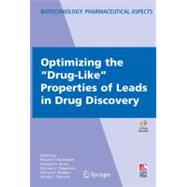
Note: Supplemental materials are not guaranteed with Rental or Used book purchases.
Purchase Benefits
What is included with this book?
| Preface | p. v |
| Strategic Use of Preclinical Pharmacokinetic Studies and In Vitro Models in Optimizing ADME Properties of Lead Compounds | p. 1 |
| Role of Mechanistic Transport Studies in Lead Optimization | p. 25 |
| Metabolic Activation-Role in Toxicity and Idiosyncratic Reactions | p. 49 |
| Case History - Use of ADME Studies for Optimization of Drug Candidates | p. 81 |
| Solubility, Solubilization and Dissolution in Drug Delivery During Lead Optimization | p. 99 |
| Lipid-based Systems, Drug Exposure and Lead Optimization | p. 131 |
| Biopharmaceutics Modeling and the Role of Dose and Formulation on Oral Exposure | p. 151 |
| Application of Physicochemical Data to Support Lead Optimization by Discovery Teams | p. 167 |
| Computational Models Supporting Lead Optimization in Drug Discovery | p. 195 |
| Prodrug Strategies for Improving Drug-Like Properties | p. 221 |
| The Application of Multivariate Data Analysis to Compound Property Optimization | p. 243 |
| Case History: Toxicology Biomarker Development Using Toxicogenomics | p. 255 |
| Predicting Idiosyncratic Drug Reactions | p. 271 |
| Elementary Predictive Toxicology for Advanced Applications | p. 301 |
| The Application of PK/PD Modeling and Simulations During Lead Optimization | p. 323 |
| Early Preclinical Evaluation of Brain Exposure in Support of Hit Identification and Lead Optimization | p. 355 |
| Optimizing Biomarker Development for Clinical Studies at the Lead Optimization Stage of Drug Development | p. 411 |
| The Relevance of Transporters in Determining Drug Disposition | p. 423 |
| Index | p. 461 |
| Table of Contents provided by Ingram. All Rights Reserved. |
The New copy of this book will include any supplemental materials advertised. Please check the title of the book to determine if it should include any access cards, study guides, lab manuals, CDs, etc.
The Used, Rental and eBook copies of this book are not guaranteed to include any supplemental materials. Typically, only the book itself is included. This is true even if the title states it includes any access cards, study guides, lab manuals, CDs, etc.